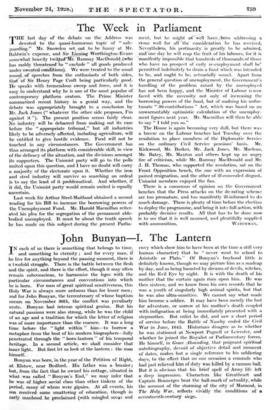The Week in Parliament
THE last day of the debate on the. Address was devoted to the quasi-humorous topic -of " safe- guarding." Mr. Snowden set out to be 'funny at Mr. Baldwin's expense, and Sir Laming -Worthington-Evans somewhat heavily twileelt. Ramsay MacDonald ..(wtfo" has rashly threatened' to " exclude " all goods produced under sweatedcanditions). We were treated to the usual round: at speeches from the enthusiasts of both sides, that of Sir Henry Page Croft being particularly good. lie speaks with tremendous.sweep and force, and it is easy to understand why he is one of the most popular of contemporary platform orators. The Prime Minister summarized recent history in a genial way, and the debate was appropriately brought to a conclusion by Mr. Jack Jones (" whatever the other side proposes, I'm against it "). The present position seems fairly clear. No industry will be debarred from making out its case before the " appropriate tribunal," but all industries likely to be adversely affected, including agriculture, will be entitled to give hostile evidence. Food will not be touched in any circumstances. The Government has thus arranged its platform with considerable skill, in view of the delicacy of the situation, and the divisions amongst its supporters. The Unionist party will go to the polls united upon this question, and I have no doubt will carry a majority of the electorate upon it. Whether the iron and steel industry will survive so searching an ordeal is to say the least of it problematical. And whether, if it did, the Unionist party would remain united is equally uncertain.
Last week Sir Arthur Steel-Maitland obtained a second reading for his Bill to increase the borrowing powers of the Unemployment Fund. Mr. Harold Macmillan reiter- ated his plea for the segregation of the permanent able- bodied unemployed. It must be about the tenth speech he has made on this subject during the present Parlia- ment, but he might ak well havc„.Acen addressing a stone wall for all-jthe consideration he has received. Neveytheless, his pertinacity is greatly to be admired, ancrone day he will reap the fruit of his labours, for it is manifestly impossible that hundreds of thousands of those who have no prospect of early re-employment shall be' permitted indefinitely to drain a fund which was intended to be, and ought to be, actuarially sound. Apart from the general question of unemployment, the Government's handling of the problem raised by the unemployed has not been happy, and the Minister of Labour is now faced with the necessity not only of increasing the borrowing powers of the fund, but of undoing his unfor- tunate " 30-contributions " Act, which was based on an unwarrantably optimistic calculation of the unemploy- ment figures next year. Mr. Macmillan will then be able to say " I told you so."
The House is again becoming very dull, but there was a breeze on the Labour benches last Tuesday over the resolution to place members of the Diplomatic Service on the ordinary Civil Service pensions' basis. Mr. Kirkwood, Mr. Barker, Mr. Jack Jones, Mr. Maclean, Mr. Batey, Mr. Maxton and others kept up an angry fire of criticism, while Mr. Ramsay MacDonald and Mr. J. H. Thomas, who supported the resolution, sat on the Front Opposition bench, the one with an expression of pained resignation, and the other of ill-concealed disgust. Unionist members enjoyed the fun.
There is a consensus of opinion on the Government benches that the Press attacks on the de-rating scheme are too premature, and too manifestly ill-informed to do much damage. There is plenty of time before the election to deploy the programme, and bring it into full action, with probably decisive results. All that has to be done now is to see that it is well manned, and plentifully supplied


















































 Previous page
Previous page